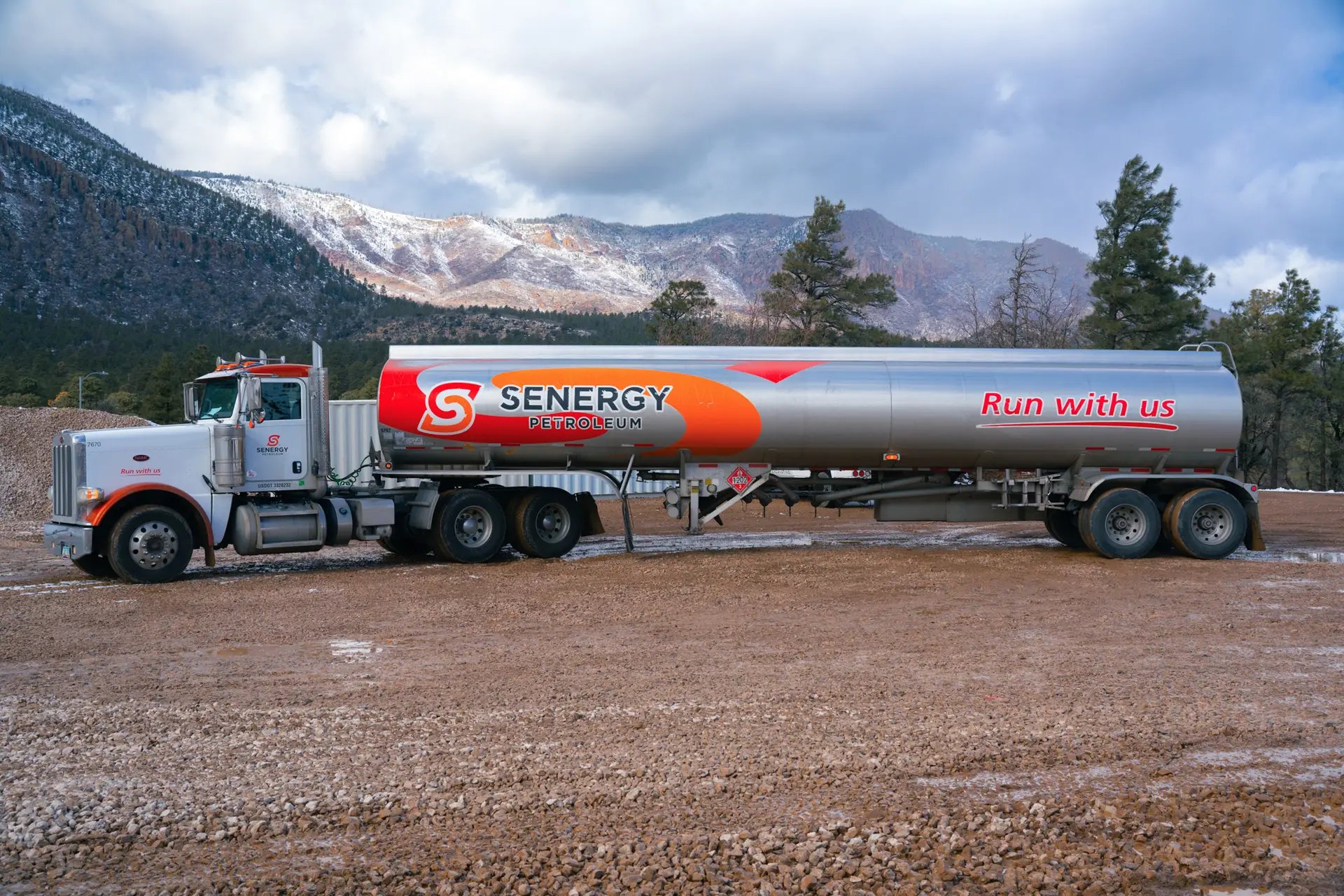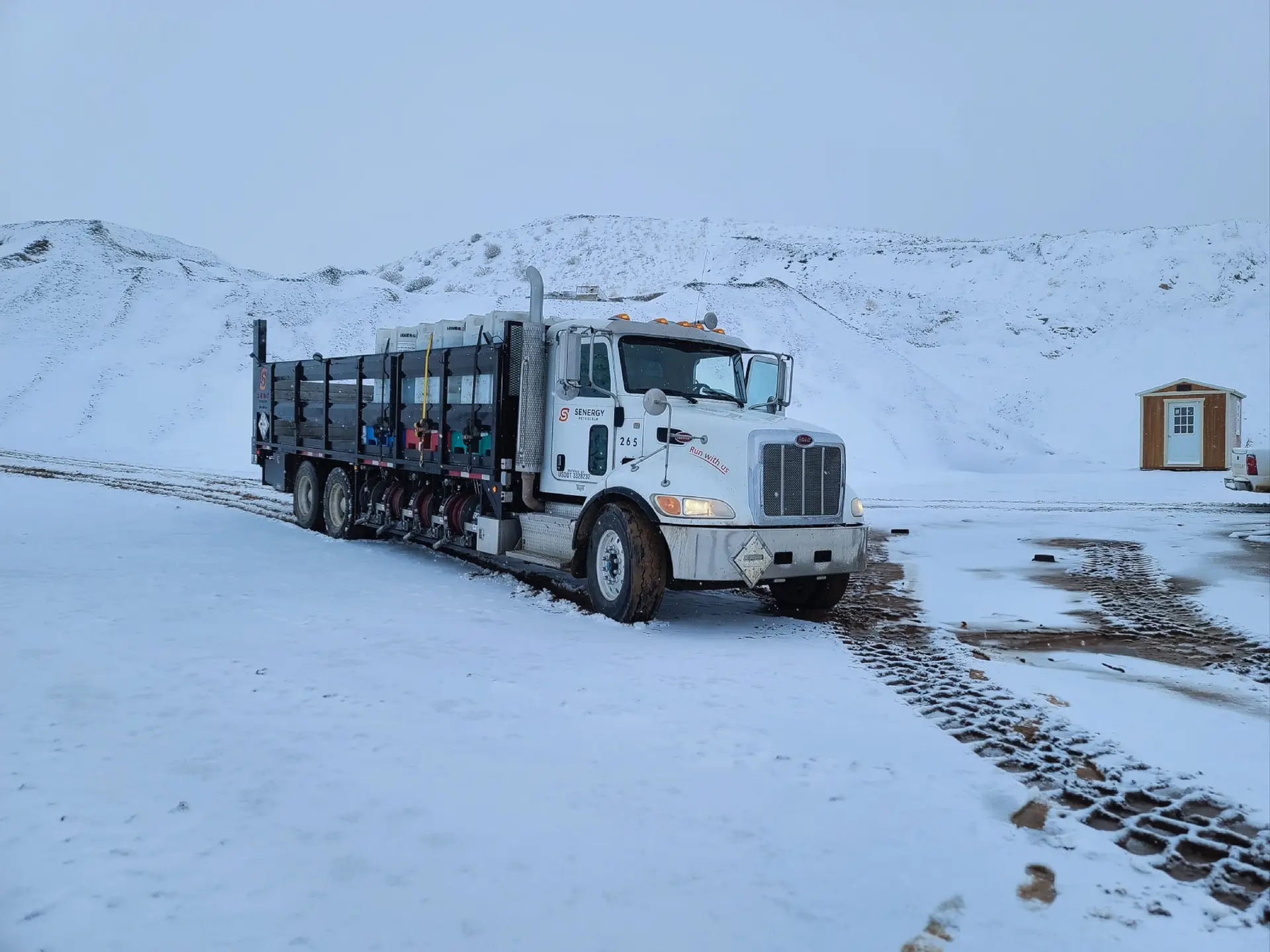Winter Fuel Tips to Keep Your Fleet Moving in Harsh Conditions
Winter’s harsh conditions directly affect how fleet engines consume fuel. As temperatures drop, diesel naturally thickens and the wax crystals within the fuel begin to harden. This causes standard diesel to cloud and eventually gel, which can block injectors and filters. When gelling occurs, vehicles may fail to start or idle properly, and fuel pumps are forced to work harder to move thickened diesel through the system. Drivers feel the impact immediately—slow acceleration, inconsistent power, and unexpected downtime.
This is why switching to winterized diesel is essential for any operation running in freezing temperatures. Winter diesel features a lower cold-filter plugging point (CFPP), significantly reducing the risk of gelling and interruptions to fuel flow. When temperatures plunge without warning, unprepared fleets can face extended delays and stalled equipment.
Understanding how diesel behaves in cold weather is the foundation of a strong winter fuel strategy. When managers fully grasp the mechanics of waxing and gelling, they can prepare their fleets more effectively and keep equipment running smoothly through severe conditions. Proactive planning, rather than reactive troubleshooting, is what keeps operations moving when temperatures drop sharply.
Choosing the Right Winter Diesel
Many winter diesel blends appear similar, but selecting the correct formulation is essential for maintaining consistent fleet performance. Some regions require only moderate winter blends, while northern routes and high-altitude areas demand highly refined options designed for extreme cold. The primary advantage of winter diesel is its ability to prevent wax crystal formation, ensuring reliable engine performance during extended periods of low temperatures.
Fuel suppliers often offer multiple winter diesel types based on expected temperature ranges, and fleets must align their selection with real operational data. In severe conditions, a premium winter diesel blend may be necessary to maintain smooth, uninterrupted performance. Industry studies routinely show that fleets operating in colder regions lose significant operating hours each year simply because they underestimate how temperature impacts fuel flow.
Choosing the right winter diesel helps prevent unnecessary downtime and reduces the strain on maintenance teams who otherwise must respond to frozen lines or stalled equipment. Fleet managers should also coordinate closely with their fuel provider to address seasonal transitions. Switching too late increases the risk of early-season issues, while switching too early can affect fuel efficiency. Proper timing keeps fleets operating reliably throughout shifting weather patterns.
The Essential Role of Anti-Gel Additives
Even with high-quality winter diesel, extremely low temperatures can still create operational challenges. Anti-gel additives serve as a critical tool for maintaining fuel flow and protecting equipment in these conditions. These additives modify how wax crystals form in diesel. Rather than developing into dense clusters that clog filters, the treated crystals remain smaller and more dispersed, allowing fuel to stay fluid and move efficiently through the system.
Industry research consistently shows that fleets using anti-gel additives strategically experience fewer cold-start failures than those relying on winter diesel alone. These products are especially valuable during sudden temperature drops or routes that cross multiple climate zones in a single run.
For best results, anti-gel additives must be applied before the fuel reaches its cloud point. Adding them after gelling has occurred will not reverse the issue. When incorporated into preventive maintenance programs, anti-gel treatments help reduce on-road breakdowns and give fleet managers greater confidence heading into winter. Integrating anti-gel use into regular refueling routines is one of the simplest and most cost-effective steps to support reliable engine performance during severe cold.
Why Tank Maintenance Is Critical for Reliable Operations
Fuel storage tanks face significant challenges in winter, and neglecting them can undermine even the strongest cold-weather fuel strategy. When temperatures fluctuate, condensation can form inside tanks, leading to water contamination—a serious threat to diesel quality. Water accelerates fuel degradation, supports microbial growth, and can freeze in fuel lines, restricting flow. For this reason, maintaining storage tanks is just as important as winterizing fleet vehicles.
Effective tank care begins with draining accumulated water from the bottom of the tank and inspecting vents, seals, and fittings for gaps that could allow moisture to enter. Using winter fuel that includes moisture-control properties can further support storage stability. Above-ground tanks may also require insulation, heaters, or circulators to help keep fuel within the proper operating temperature range.
Industry analyses consistently show that fleets with poorly maintained storage tanks experience more frequent filter clogging, reduced engine performance, and an increased need for emergency service. Tank hygiene is essential. Even the highest-quality winter diesel can gel or separate if stored under improper conditions. Clean tanks protect fuel quality, and clean fuel supports dependable engine performance throughout severe winter conditions.


Essential Steps for Dependable Cold-Weather Performance
A strong winter fuel strategy is not complete without preparing engines and filters for the season. Colder temperatures force engines to work harder, and any restriction in fuel flow can quickly reveal underlying issues. As winter approaches, fleets should replace fuel filters, inspect water separators, evaluate injector performance, and ensure lift pumps are operating correctly. The goal is to eliminate bottlenecks before cold weather amplifies small problems.
Diesel behaves differently in winter, and components that function acceptably in warm weather can become major obstacles in freezing temperatures. A filter that is partially clogged in summer may restrict fuel flow enough to cause stalling or hard starts in winter. Many fleets install block heaters or preheat engines to support faster starts and reduce strain on batteries and starter systems. When paired with appropriate fuel treatments, these practices build a reliable foundation for uninterrupted operation.
Industry research shows that most winter-related downtime stems from overlooked maintenance rather than fuel quality alone. Well-prepared engines burn winter diesel efficiently and sustain reliable power under heavy workloads. By winterizing engine components and ensuring unobstructed fuel flow from the tank to the injectors, fleets can maintain productivity even during extreme cold.
Best Practices for Smooth, Reliable Operations
Properly handling cold-weather fuel is just as important as selecting the correct winter blend. If fuel is stored or managed incorrectly, it can thicken, collect moisture, or degrade before it ever reaches a vehicle. Whenever possible, fuel should move through heated or insulated lines—especially in remote or high-exposure locations. Operators should also be trained in winter-specific dispensing practices, such as minimizing open-hatch time, limiting fuel exposure to freezing air, and allowing fuel to settle before dispensing.
Industry comparisons show that fleets that follow disciplined dispensing procedures significantly reduce the risk of contamination. Maintaining refueling equipment is just as critical. Pumps, hoses, and fittings must remain in good working order, as frozen components can slow operations and hinder flow. Nozzles should be cleaned and dried regularly since snow or ice buildup can prevent proper sealing during refueling.
Implementing a winter handling checklist helps ensure every step is consistently followed. Combined with winter diesel and anti-gel additives, proper fuel handling creates an added layer of protection for the fleet. These practices support smoother fuel flow, minimize operational interruptions, and help maintain reliable refueling throughout the winter season.
Ensuring Reliable Performance in Cold Conditions
Operators and drivers serve as the first line of defense against winter-related fuel challenges. Even the most robust winter fuel plan can fail without proper training. Operators must recognize early warning signs—slow cranking, reduced power, irregular idling, or sudden filter blockages—that indicate fuel-related issues in cold weather.
Effective fleet winterization includes preseason training sessions covering fuel types, anti-gel use, equipment preparation, and cold-weather driving practices. A well-trained crew can extend engine life by responding quickly and avoiding errors that lead to costly downtime. Operators also need to understand optimal idling procedures, safe engine warm-up practices, and the timing required to maintain performance.
Industry research demonstrates that fleets with thoroughly trained personnel experience significantly less winter downtime. Winter readiness also includes reviewing fuel access along routes, adjusting schedules for weather, checking parking areas for heater availability, and ensuring each vehicle carries the proper emergency equipment. When planning, training, and fuel management align, fleets gain a competitive advantage in harsh conditions. Proper preparation keeps trucks running smoothly, reduces operational interruptions, and supports overall reliability.
Preparing Fleets for Winter
Winter presents some of the toughest conditions for any fleet, but proper preparation ensures reliable performance. From selecting dependable winter diesel to using anti-gel products and maintaining trained operators, every step is critical to keeping engines running and schedules on track.
Senergy plays a key role in this process. Fleets across the Southwest and Rockies rely on Senergy for high-quality winter fuels, additives, and equipment designed to perform in extreme conditions. Partnering with Senergy provides more than fuel—it delivers reliability, consistency, and confidence when downtime is not an option.
With the right products, planning, and expertise, fleets can navigate winter efficiently, protecting both vehicles and overall operations.

